Proton VPN Fast factsOur rating: 4.5 stars out of of 5
|
In 2023, we found Proton VPN to be a well-rounded VPN with its unique, Swiss-based privacy and generous free tier. Based in Switzerland, Proton complies with Switzerland’s strong privacy laws — a plus for businesses and individuals concerned about government data requests.
A year later, Proton VPN brings significant updates that I feel make one of the best VPNs available in the market. Chief among these is a larger server network, an updated third-party audit, and more affordable pricing.
In this review, let’s take a look if Proton VPN is the right choice for you and your business in 2024.
Proton VPN pricing
| Proton VPN Free | Proton VPN Plus | Proton VPN Unlimited | |
|---|---|---|---|
| 1 year | Free | $4.99 per month | $9.99 per month |
| 2 years | Free | $4.49 per month | $7.99 per month |
| 1 month | Free | $9.99 per month | $12.99 |
| VPN speed | Medium | Fastest | Fastest |
| Main Features |
|
|
|
When it comes to pricing, I found Proton VPN falls in the middle amongst its competition. At $4.99 per month for its one-year Plus plan, it’s more expensive than Private Internet Access’ equivalent one-year subscription at $3.33 per month. However, it’s also more affordable than ExpressVPN’s one-year plan priced at $8.33 per month.
Compared to last year, Proton VPN is also now more affordable. In 2023, its one-year Proton VPN Plus subscription cost $5.99 per month. Today, it’s $4.99 per month.
The two-year plan is also cheaper, now at $4.49 per month to 2023’s $4.99 per month. On the opposite side, its one-month subscription is slightly more expensive now at $9.99 per month, compared to last year’s $8.99 price tag.
While these aren’t massive decreases in price, they are appreciated considering how the improvements implemented in Proton VPN in 2024 — something we’ll get into further down this review.
If you plan on connecting multiple devices or need the fastest connection, I recommend going for Proton VPN Plus. It allows users to connect 10 devices simultaneously, has Proton’s fastest speeds at the lowest possible cost, and includes Proton’s full server suite. Those who also use VPNs for torrenting (P2P) and streaming should opt for the VPN Plus plan, as this is not available on Proton VPN’s free version.
Lastly, I recommend Proton Unlimited only for users who want Proton’s other encryption-based services on top of the features you get with VPN Plus.
Is Proton VPN actually free?
Yes, Proton VPN has a fully free version alongside its two paid plans. It offers free access to servers from five countries, namely the United States, Netherlands, Japan, Romania, and Poland.
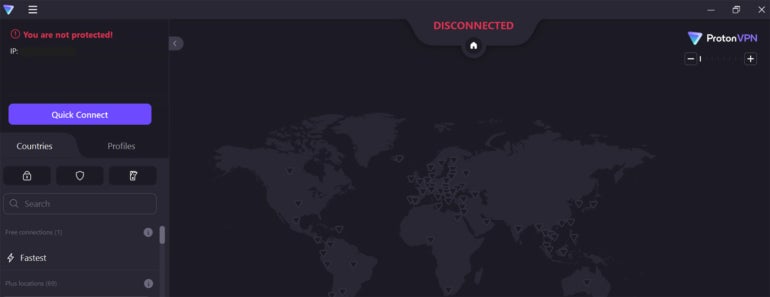
With the free version, you get medium VPN speed, a kill switch, and unlimited data. Windows and Android users also get access to Proton’s split tunneling feature for free. As a free VPN, I appreciate Proton offering unlimited bandwidth, especially since other free VPNs usually impose a monthly or daily data cap. I think this implementation is better if you need a cost-effective way to simply change your IP address.
However, there is a limitation I want to mention: Proton VPN’s Free version doesn’t let you choose which of the five free VPN locations you connect to. This means you will need to go through a bit of trial and error before you get connected to your desired country. As mentioned, you also won’t get access to the full 112-country server fleet available in its premium plan.
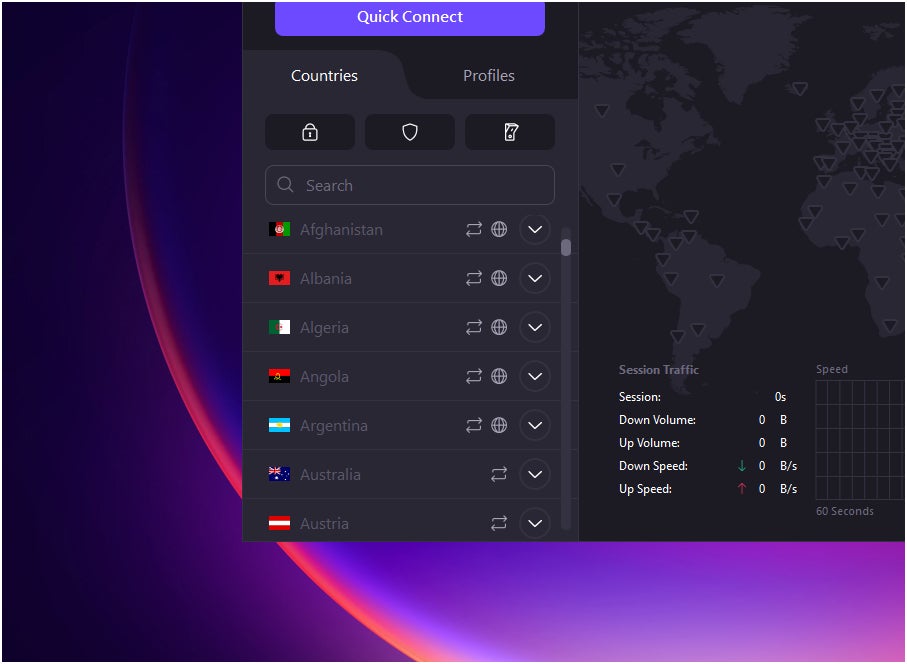
While I find this to be a fair restriction, I can understand users that may want the control of being able to choose which location to connect to. If you’re one of these people, I suggest looking into Speedify VPN. It’s a decent service that has a free version VPN that allows manual country selection. Take note, however, that it imposes a 2-10 GB monthly data cap.
SEE: Proton VPN Free vs Premium: Which Plan Is Best for You? (TechRepublic)
In my view, the free version is best for users who are unsure about spending on a full VPN service or those who only need one VPN connection and basic functionality.
Is Proton VPN safe?
Yes, I consider Proton VPN to be a secure and safe VPN. It offers industry-standard protocols OpenVPN and IKEv2, as well as the newer WireGuard and Stealth protocols across the Windows, macOS, Linux, Android, and iOS versions. This gives users a mix of more established and well-tested security protocols and more recent offerings with newer technologies.
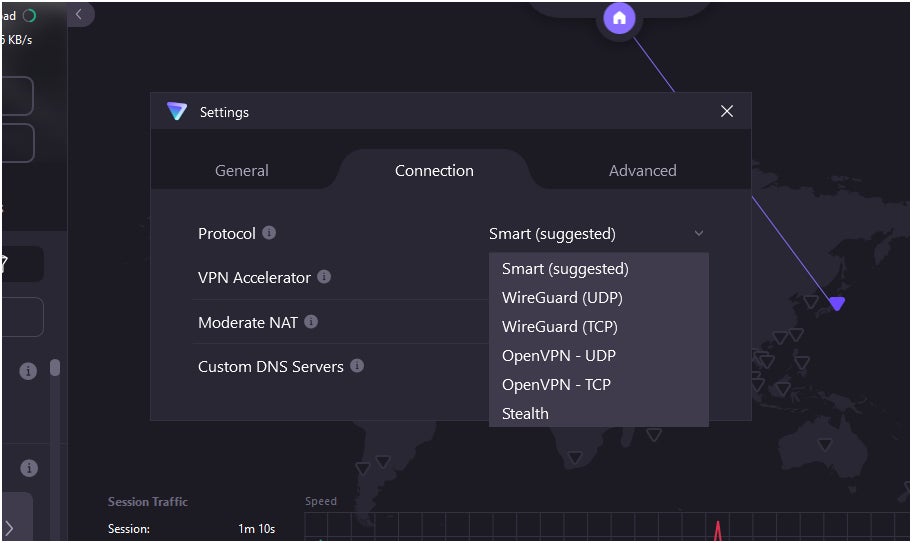
Proton VPN also operates under a strict no-logs policy, which means they don’t log user activity or metadata. This covers websites visited, session lengths, IP addresses, or any data that could be used to identify a user. It’s also an open source VPN, which means that its code is publicly available for review. Personally, I know privacy enthusiasts and developers will appreciate this as it allows them to spot vulnerabilities in Proton VPN’s source code themselves.
When I reviewed Proton VPN last year, its newest independent security audit had been conducted way back in 2021. While I laud VPN providers for having their services audited, a key consideration would be how frequent these audits are done to account for changing circumstances.
Now that it’s 2024, I’m very happy to report that it has a more recent external audit focused on its no-logs policy. The third-party audit, conducted by Securitum, confirmed that Proton VPN did not, in fact, store any user logs. This is crucial given how easy it is for software providers to make security claims — without actually following through on promises.
One thing I failed to mention last year was Proton VPN’s impressive encounter with the Swiss court system in 2019. In that incident, a data request from another country was sent to Proton VPN and was approved by the Swiss court system. However, because Proton VPN did not have any customer IP data, it was not able to provide the information requested.
To me, this is real-world proof that Proton VPN doesn’t log or secretly hide any user data for its own benefit.
SEE: 6 Best Anonymous (No-Log) VPNs for 2024 (TechRepublic)
Key features of Proton VPN
Proton VPN offers a variety of features that protect and secure user data. This includes its coverage under Swiss privacy laws, good speed and performance, and DNS leak protection.
Swiss-based privacy
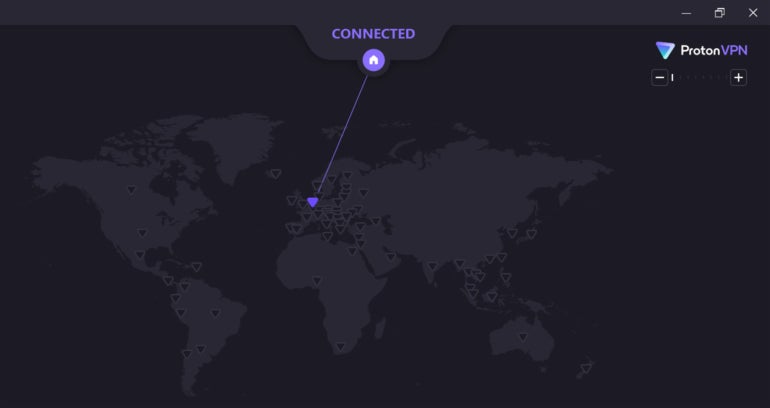
Proton VPN is owned by a company called Proton AG, a technology provider based in Switzerland. As Proton VPN is based in Switzerland, it complies with the country’s strong privacy laws and political neutrality. All Proton users will enjoy the same legal privacy protections that Swiss citizens do.
This also means that any requests for Proton user data can’t be granted without a Swiss court order. This is a key feature for users or businesses that are concerned about government intervention. While no country is immune to breaches, Proton’s compliance with Swiss laws will grant a layer of protection you won’t find with other VPNs.
DNS leak protection
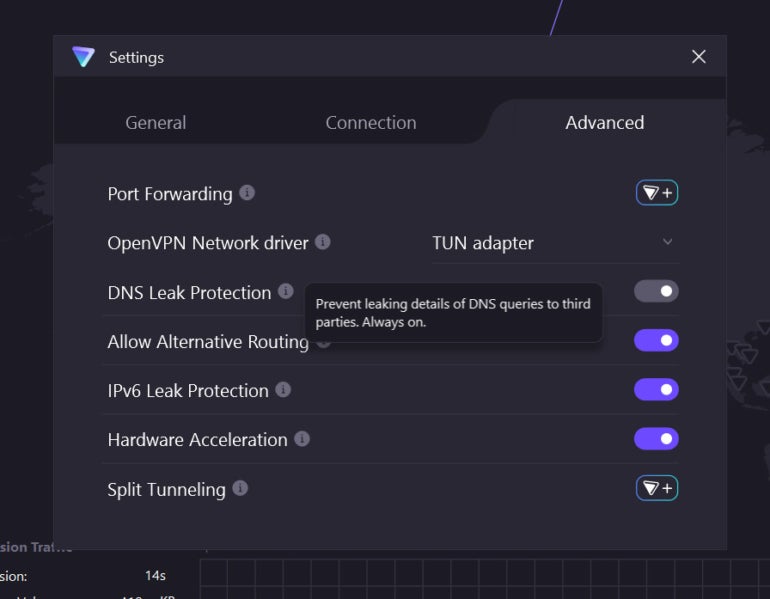
Proton VPN also promises protection against DNS leaks during dropped connections. To test this, I ran Proton VPN Free through a DNS leak test tool multiple times. Throughout testing, no leaks were detected.
Proton also activates DNS Protection out of the box. Given that DNS leak protection is a crucial VPN feature, we commend Proton for setting it to “always on” upon setup.
Kill switch
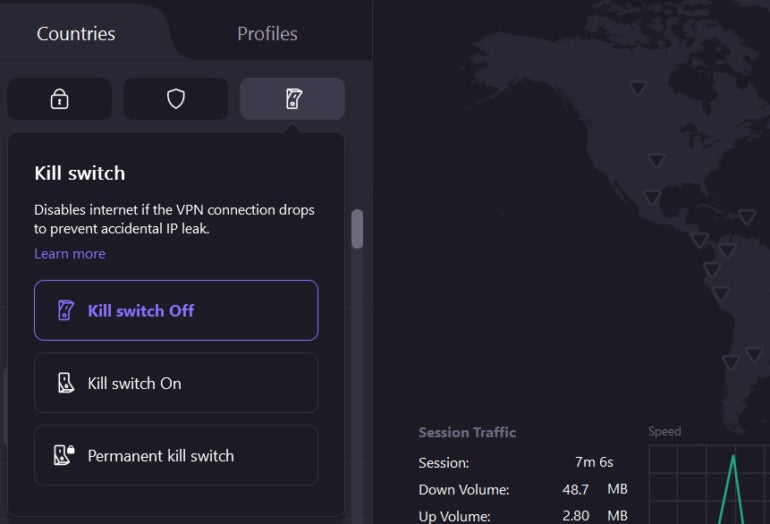
Proton also comes with a kill switch that acts as a last line of defense during an outage or disruption. In the event your VPN connection fails, the kill switch will automatically stop your machine from reconnecting to the internet without the VPN’s protection. This prevents any unwanted sharing of data from your computer to your internet service provider.
It goes further as Proton allows users to turn on a “permanent kill switch.” When activated, any connection not done via a Proton VPN server is blocked or cut out.
In my testing, the permanent kill switch worked as advertised — even with the main app closed and running in the background. This set-it-and-forget-it feature can keep your data private during unwanted disruptions.
Speed and performance: How fast is Proton VPN?
While it’s normal to have lower upload and download speeds with a VPN, Proton VPN still provided good and stable numbers during testing.
As an initial disclaimer, my 2024 testing of Proton VPN was fully with its free version. This means that my data speeds were capped, with Proton VPN’s fastest VPN speeds being reserved through one of its paid plans.
However, I was pleasantly surprised with how well Proton VPN’s free version fared. Just like in 2023, Proton VPN gave me consistently fast speeds with no noticeable drops in performance.
This was true during my general use of the service, which included browsing social media, accessing Google services like Docs and Drive and watching YouTube videos. I also didn’t experience any difficulty maintaining a stable connection while testing Proton. For speed and stability, Proton VPN performed well.
In terms of speed test results, Proton VPN’s free version was surprisingly fast. Even with capped speeds, it only decreased my download speed around 2.87% compared to my internet service provider. For upload speeds, it was excellent, actually recording 76.4% faster speeds than my ISP.
Again, this is Proton VPN’s free tier, so I expect speeds to be less consistent than its premium versions.
Proton VPN servers and locations
As of October 2024, Proton VPN’s server network has around 8,500+ servers from 112 countries — giving it one of the larger server suites in the space. This is a big increase compared to last year, wherein Proton’s server fleet comprised a respectable 3,024 servers in 69 countries.
In comparison, NordVPN currently has 6,400 servers in 111 countries, while Surfshark VPN has 3,200+ servers in 100 countries. To me, this is perhaps the biggest improvement Proton VPN had over the past year. Considering how one of the main uses of a VPN is to unblock geo-restricted content, I appreciate the Proton VPN team’s commitment in expanding its server network in such a short amount of time.
Proton VPN offers three different server types: Free, Plus, and Secure Core servers. Free servers, which come with Proton’s free version, provide basic protection with medium speeds. Meanwhile, Plus servers allow streaming support, ad blocking, torrenting and a faster connection.
Lastly, Secure Core servers add to Plus servers’ functionality by introducing stronger protection against data attacks. Secure Core routes your traffic through multiple servers, making it harder for bad actors to attain your true IP address. These servers are wholly owned by Proton and are housed in privacy-friendly countries (like Switzerland or Iceland) for even more security.
In my view, Secure Core is a unique selling point of Proton VPN that many privacy-focused users will find valuable. This is especially true if you use servers located in more high-risk areas like the U.S.
SEE: ProtonVPN vs AtlasVPN (2024): Which VPN Should You Use? (TechRepublic)
Proton VPN pros
- Offers strong Switzerland-based privacy features.
- Implements a strict no-logs policy.
- Provides more than 8,500 servers in 112 countries.
- Open source and independently audited.
- Has a free version.
- Supports up to 10 simultaneous connections.
Proton VPN cons
- Free version doesn’t let you choose server location.
- Desktop interface could be overwhelming at first.
- Live chat support is only available for paid users.
Who is Proton VPN best for?
If you’re looking for a VPN that specializes against government surveillance, Proton VPN is a great solution. Its Swiss-backed privacy is a meaningful value proposition, especially when it comes to protecting sensitive business or user data. It also gets a lot of the core features right with its strong set of protocols, kill switch, and DNS leak protection, to name a few.
As of 2024, it also carries one of the largest server networks available in VPNs today at 8,500+ servers across 112 countries. Proton VPN is made for those who want an integrated ecosystem of encrypted and secure software. Proton also offers the VPN bundled with its other encrypted services through its Proton Unlimited plan.
While there are cheaper options out there, Proton’s overall package and lack of glaring drawbacks make it a good choice. Unsure buyers also have the benefit of being able to access Proton VPN for free.
SEE: How to Create an Effective Cybersecurity Awareness Program (TechRepublic Premium)
Proton VPN alternatives
While Proton VPN is a solid VPN option, not everyone will find it a good fit. We’ve listed similar alternatives below that offer different features for each VPN user.
NordVPN

NordVPN is one of the most well-known VPNs in the market today. Nord is great for secure file-sharing, as its Meshnet feature allows users to transfer and share files through their own private encrypted network. It has around 6,400+ servers in 111 countries and a threat protection feature that combats malware, ads, and web trackers.
To find out more, check out our full NordVPN review.
Surfshark

Another prominent VPN is Surfshark. This VPN is best for multiple devices, as it gives users an unlimited number of device connections to the service. It also has zero bandwidth limitations and offers a seven-day free trial to test it out.
To learn more, check out our full Surfshark VPN review.
CyberGhost VPN

CyberGhost VPN is another great VPN solution. It’s known for its extensive server network, offering servers in 100 countries and 126 locations. This allows users to access a broad selection of geo-restricted content while maintaining a stable connection.
To discover more, check out our full CyberGhost VPN review.
Review methodology
My review of Proton VPN involved a detailed assessment of its security features, cost, and real-world performance. I had hands-on time with ProtonVPN’s free version and supplemented my findings with user testimonials and reputable reviews for both the free and paid tiers.
For speed and performance, I tested ProtonVPN Free using a Windows computer and ran it through Ookla’s Speedtest. As a disclaimer, VPN speeds will vary depending on a lot of factors: your internet service provider, your device, your location, and the particular server you choose. To test for DNS leaks, I ran Proton VPN Free multiple times through DNSleaktest.
Finally, I scored Proton on everything from its pricing to its protocols based on an internal algorithm to get a final rating of 4.5 out of 5 stars. The scoring on the rubric was based both on Proton VPN on its own and in relation to other VPN services in the market.
















Leave a Reply